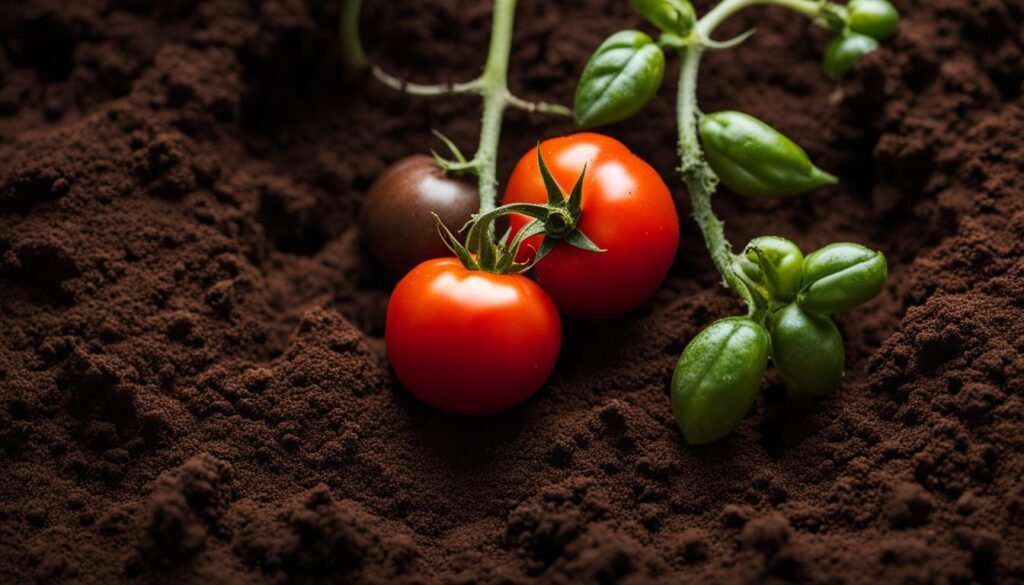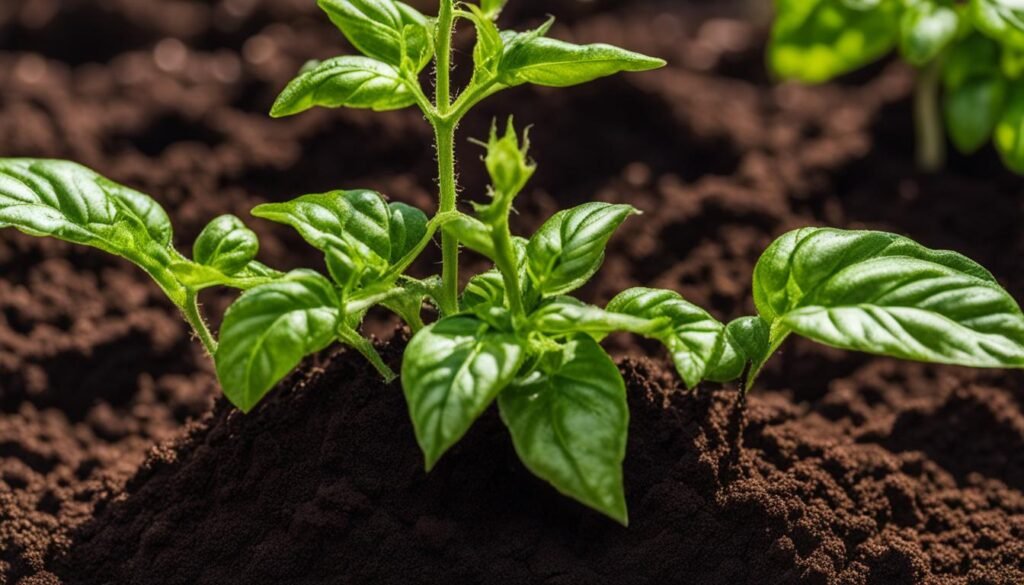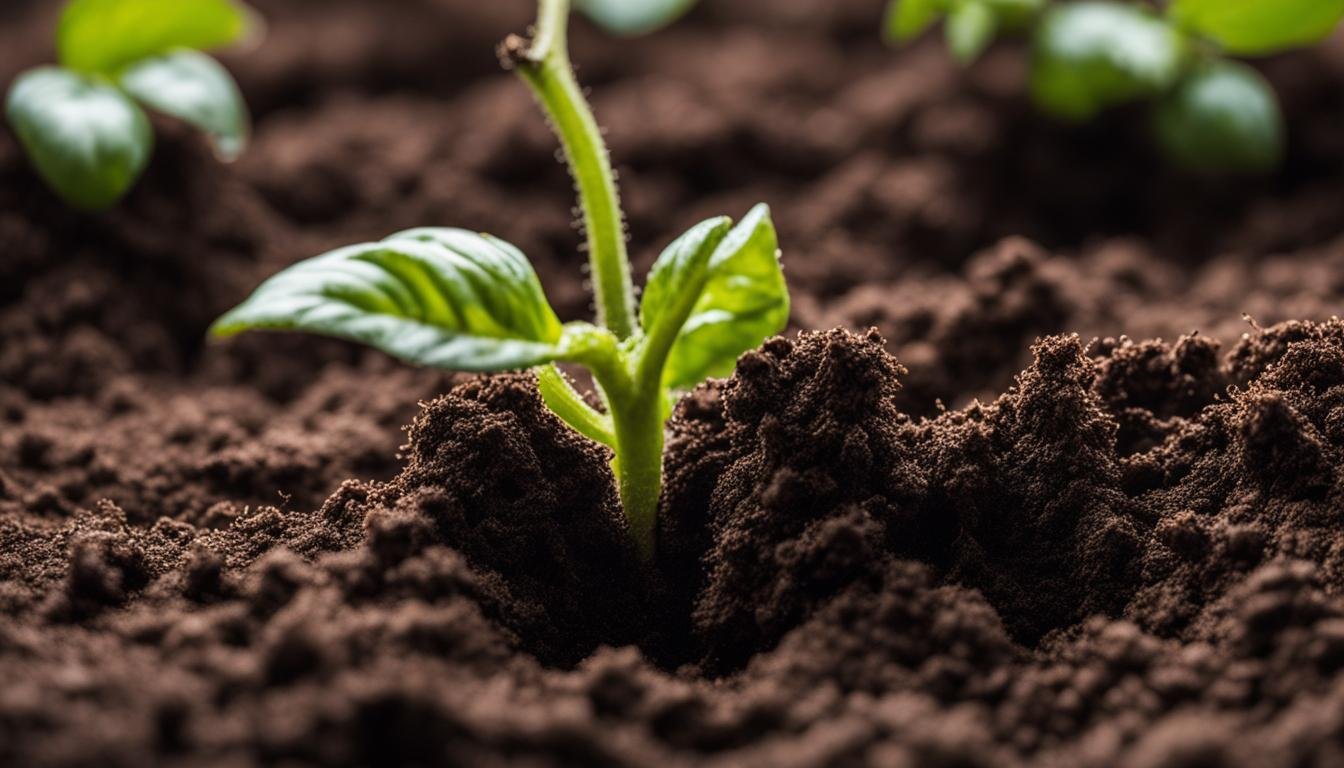Welcome to our gardening blog! Today, we’re diving into a popular topic among gardeners: coffee grounds and tomato plants. You may have heard that coffee grounds can benefit tomato plant growth, but is there any truth to this claim? Let’s explore the benefits and effects of using coffee grounds for tomato plants.
Key Takeaways:
- Coffee grounds alone are not very effective for tomato plant growth as their nutrient concentration is too low.
- Using coffee grounds as a soil amendment in compost or vermiculture systems can contribute to the overall health of the soil.
- Tomato plants require high levels of nitrogen, phosphorus, and potassium, which coffee grounds do not provide in adequate amounts.
- Coffee grounds can still be beneficial as a soil amendment, improving soil structure, aeration, and drainage.
- When used in combination with proper fertilization and watering practices, coffee grounds can contribute to overall plant health and productivity.
The Myth of Coffee Grounds as Fertilizer for Tomato Plants
When it comes to fertilizing tomato plants, many gardeners have heard the myth that coffee grounds can work wonders. But is there any truth to this popular belief? Let’s take a closer look at the role of coffee grounds as a fertilizer for tomato plants.
1. Limited Nutrient Content: Coffee grounds do contain some nutrients that can be beneficial for plant growth, such as nitrogen and potassium. However, the concentration of these nutrients in coffee grounds is relatively low, meaning they may not provide the necessary nutrition that tomato plants require for optimal growth.
2. Imbalanced Nutrient Ratio: Tomato plants have specific nutrient requirements, including a higher demand for phosphorus. Coffee grounds, on the other hand, are typically low in phosphorus. Therefore, using coffee grounds alone as a fertilizer for tomato plants may result in an imbalanced nutrient ratio, which can negatively affect plant health and productivity.
3. Acidic pH Levels: One aspect of coffee grounds that can impact tomato plants is their slightly acidic pH. While tomatoes prefer a slightly acidic soil, excessive acidity can hinder nutrient availability and uptake. Therefore, it’s important to use coffee grounds in moderation and monitor the pH levels of the soil to ensure it remains within the optimal range for tomato plants.
In summary, while coffee grounds may have some minor benefits as a soil amendment, they are not a suitable substitute for traditional fertilizers when it comes to tomato plants. To provide the necessary nutrients for healthy growth and abundant harvests, it’s best to use organic tomato-specific fertilizers that are specifically formulated to meet the needs of these plants.
Coffee Grounds as a Soil Amendment for Tomatoes
When it comes to boosting the health and vitality of your tomato plants, coffee grounds can be a valuable addition as a soil amendment. While coffee grounds alone may not provide sufficient nutrients for tomato plants, they offer other benefits that can enhance the overall health of the soil and create a favorable environment for plant growth.
How coffee grounds improve soil structure
Coffee grounds are rich in organic matter, which helps improve soil structure and composition. When added to the soil, coffee grounds break down over time, enhancing soil aeration and drainage. This promotes root development and allows the plants to access water and nutrients more effectively. The improved soil structure also helps prevent compaction, ensuring that the plant roots have enough space to grow and thrive.
The role of coffee grounds in boosting tomato plant health
In addition to improving soil structure, coffee grounds can also contribute to the overall health of your tomato plants. The organic matter in coffee grounds acts as a slow-release fertilizer, gradually releasing nitrogen, phosphorus, and potassium into the soil as it decomposes. These nutrients are essential for plant growth and development, and their availability can support healthier and more productive tomato plants.
Furthermore, coffee grounds have a slightly acidic pH, which can create an optimal growing environment for tomatoes. Tomatoes prefer a slightly acidic soil, and the acidity of coffee grounds can help maintain the ideal pH level for these plants. Additionally, coffee grounds can act as a natural mulch, helping to suppress weed growth around the tomato plants and conserve moisture in the soil.
When using coffee grounds as a soil amendment, it is important to mix them with other organic materials, such as compost, to ensure a balanced nutrient profile. Composting the coffee grounds before adding them to the soil also allows them to break down fully, maximizing their benefits. Overall, by incorporating coffee grounds into your gardening routine, you can improve soil health and create a more favorable environment for the growth and productivity of your tomato plants.
The Effects of Coffee Grounds on Tomato Plant Growth

When it comes to tomato plant growth, many gardeners wonder about the effects of using coffee grounds. While coffee grounds may not be a miracle solution, they can still have some positive impacts on your tomato plants. Here are a few ways in which coffee grounds can enhance the growth and production of tomatoes:
1. Improved Soil Fertility:
Coffee grounds contain small amounts of nutrients like nitrogen, phosphorus, and potassium. Although the concentration may not be high enough to significantly impact tomato plant growth, these nutrients can contribute to improving overall soil fertility. When mixed with compost or organic matter, coffee grounds can help enrich the soil and provide a more favorable environment for tomato plants.
2. Enhanced Soil Structure:
Another benefit of using coffee grounds is that they can improve soil structure. Coffee grounds are rich in organic matter, which helps to loosen compacted soil and improve drainage. This allows for better root development and nutrient uptake in tomato plants. By incorporating coffee grounds into your soil, you can create a well-balanced growing medium that promotes healthy tomato plant growth.
3. Natural Pest Control:
Coffee grounds have a slightly acidic pH, which can help deter pests like slugs and snails. These pests are known to feed on young tomato plants and can cause damage to both the leaves and fruits. By applying a layer of coffee grounds around the base of your tomato plants, you can create a barrier that acts as a natural deterrent for these pests.
While coffee grounds alone may not be a magic solution, when used in conjunction with proper fertilization, watering, and other gardening practices, they can contribute to better tomato plant production. By incorporating coffee grounds into your gardening routine, you can provide your tomato plants with a nutrient-rich soil and create a more favorable growing environment.
The Controversy Surrounding Coffee Grounds and Tomato Plants

The use of coffee grounds for tomato plants is a topic that sparks a lot of debate among gardeners. Some believe that coffee grounds can provide significant benefits, while others argue that they have little to no effect on plant growth. The truth lies somewhere in between, and it’s important to understand the nuances and considerations involved.
While coffee grounds may not be a miracle solution for tomato plants, they can still offer some minor benefits. Coffee grounds are rich in organic matter, which can help improve soil structure, aeration, and drainage. Additionally, they have a slightly acidic pH, creating an optimal growing environment for tomatoes.
That being said, it’s crucial to use coffee grounds in moderation and in combination with other gardening practices. They should not be used as a substitute for traditional fertilizers, as tomato plants require high levels of nitrogen, phosphorus, and potassium. However, incorporating coffee grounds into your gardening routine can contribute to overall soil health and create a favorable environment for tomato plant growth.
The Benefits and Considerations of Using Coffee Grounds for Tomatoes:
- Rich in organic matter, improving soil structure, aeration, and drainage.
- Slightly acidic pH, creating an optimal growing environment for tomatoes.
- Can be used as a mulch to suppress weed growth and conserve moisture in the soil.
- Should be used in moderation and in conjunction with proper watering and fertilization practices.
By understanding the controversy surrounding coffee grounds and tomato plants, you can make informed decisions about incorporating them into your gardening routine. Remember to approach the use of coffee grounds as a supplemental practice rather than a standalone solution, and always prioritize the specific nutrient needs of your tomato plants.
Conclusion
In summary, coffee grounds can be a valuable addition to your tomato plant care routine. While they may not be a replacement for traditional fertilizers, coffee grounds can still contribute to the overall growth and health of your tomato plants.
It is important to remember that coffee grounds should be used in moderation and in combination with other gardening practices. They can be beneficial as a soil amendment, helping to improve soil structure and create a conducive environment for tomato plant growth.
By incorporating coffee grounds into your gardening routine, you can enhance the productivity of your tomato plants and create a favorable growing environment. Remember to also maintain proper watering and fertilization practices for optimal results.
FAQ
Do coffee grounds work as fertilizer for tomato plants?
No, coffee grounds alone do not provide sufficient nutrients for tomato plants. They are best used as a soil amendment in compost or vermiculture systems.
Can coffee grounds be used as a substitute for traditional fertilizer for tomato plants?
While coffee grounds contain some nutrients beneficial for plant growth, they do not provide the necessary levels of nitrogen, phosphorus, and potassium required by tomato plants. It is recommended to use organic tomato-specific fertilizers.
How can coffee grounds benefit tomato plants?
Coffee grounds can improve soil structure, aeration, and drainage when used as a soil amendment. They can also create a slightly acidic pH, which is favorable for tomato plant growth. Additionally, as a mulch, coffee grounds can suppress weed growth and conserve soil moisture.
Can coffee grounds enhance tomato plant production?
While coffee grounds alone may not have a significant impact on tomato plant growth, when used in combination with proper fertilization and watering practices, they can contribute to overall plant health and productivity.
Is there a controversy surrounding coffee grounds and tomato plants?
Yes, some gardeners believe in the benefits of coffee grounds for tomato plants, while others argue they have little to no effect. The truth lies somewhere in between, with coffee grounds providing some minor benefits when used in moderation.

Leave a Reply